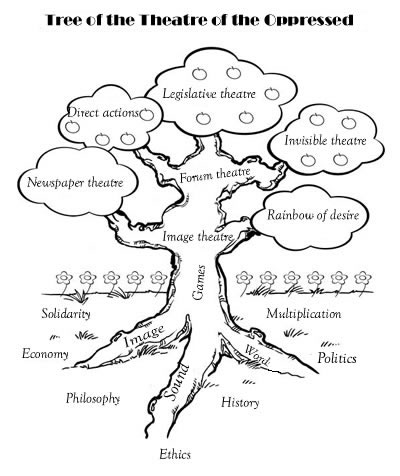As I consider both a pending production of The Pirates of Penzance and the commedia masks I will be making later this summer, I am reminded that the performing arts have been a form of protest since people gathered around a campfire and a storyteller wove critique into his or her tale, since the first time homo erectus cracked a joke at the expense of someone with more social power. Although the performing arts certainly include music (and I would include the haunting soundscape of the Casserole Protests, with their conscious ‘symphonizing’ of rhythm, volume and melody, in this category), my emphasis here will be on protest actions that involve movement and theatre.
A subset of what is generally termed “Theatre for Social Change,” performance protest (or performance as protest) comes in many forms, and one would select a form based on who the participants were, how interactive the initiators wanted the performance protest to be, how much preparation time was available, where the performance protest would take place, and in what matter the target groups were to be impacted. For example, the design of the Pots and Pans protests empowers people to join — one does not need to prepare, one does not need to be able to walk or speak or sing, one does not need to show one’s face if anonymity is preferred, one may participate while protected from weather or possible immediate backlash, one does not need specific sound-makers, and so on. Maximizing participation increases the message of solidarity, and the general public, as they become aware of the performance protest, may self-select to become a performer/participant or an audience member/consumer. Sound-based performances are perfect for those parameters!
But what if your message is more specific? What if there are specific ideas or relationships or data or events or liminalized actions that you the initiators want to bring to light? This is where the realm of movement/theatre might be your best bet.
These types of theatre exist all over the world; I will be touching on a few prevalent in Canada and the U.S..
*Plays. Of course, there are many plays, comic and tragic, that are intended to illuminate/bring attention to an event or idea, and there are companies galore that specialize in these works. Most are in a “Theatre Companies” list of any major city.
*Populist Theatre. This is the term used to describe community embracing/community empowering performance projects by which a small core of people elicit stories and images from a specific community or with the public at large, and, working with community stakeholders, develop a pageant-like public performance. Bread and Puppet http://breadandpuppet.org always uses this form, and it is also often a part of Mayworks Festival http://www.mayworks.ca/
*Commedia dell Arte. One of my favorite forms of protest, commedia dell ‘arte arose in Italy in the 1500s , empowering the peasantry with information and comic satire while providing a rollicking good time. The relationships, plot devices, and comic lazzis have become classic delightful and effective structures upon which to build your own hilarious and pointed piece. Historically, commedia companies are on the move, in part because they make too much trouble. Relies on a strong core of performers but has lots of audience interaction! Commedia dell ‘Arte: A Handbook for Troupes by Crick & Rudin; San Francisco Mime Troupe http://www.sfmt.org/index.php;
Dell ‘Arte Company http://www.dellarte.com/default.aspx
*Clowning. There are so many clown forms! Basically, clowns reveal the absurdity of what we do, make us laugh at ourselves at our worst, and create longing for ourselves in our best, most poignant moments. There are so many incredible clowns — some of my favorites are Mump & Smoot, Morro and Jasp and Bill Irwin. Can be incredibly powerful and revealing, and travels easily, as there are generally two or three performers. Can be lots of audience involvement or not. Historically, clowns are arrested!
*Interactive Sociodrama. To quote the late great Augusto Boal (speaking in this moment of the subtype known as ‘Formum Theatre’), “FORUM-THEATRE presents a scene or a play that must necessarily show a situation of oppression that the Protagonist does not know how to fight against, and fails. The spect-actors are invited to replace this Protagonist, and act out — on stage and not from the audience — all possible solutions, ideas, strategies. The other actors improvise the reactions of their characters facing each new intervention, so as to allow a sincere analysis of the real possibilities of using those suggestions in real life. All spect-actors have the same right to intervene and play their ideas. FORUM-THEATRE is a collective rehearsal for reality.”
http://www.theatreoftheoppressed.org/en/index.php?useFlash=0
There are other kinds of protest performance, including other forms of street theatre, Environmental Theatre, and Guerilla Theatre, as well as many solo performance artists and story tellers whose work is based in protest, but the above are a good place to start!



